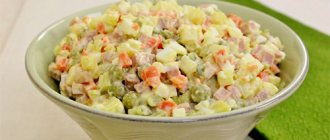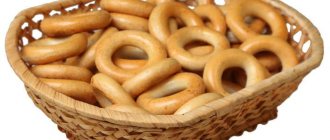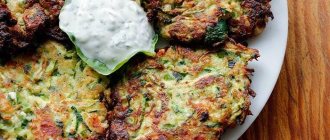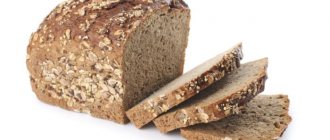There is an expression that the further north a people lives, the more soup recipes are on their menu. Judging by the variety of this dish in Slavic cuisine, we are experienced northerners. Everyone here loves soups: they cook quickly, fill you up just as quickly, warm you with the warmth of home cooking, and are a universal dish. Do you know what soups are allowed for nursing mothers in the first month of breastfeeding?
Soups during breastfeeding for mothers who are always worried are a real salvation. This dish has a lot of advantages: from ease of preparation to great benefits. In addition, you don’t have to separate your diet from the menu of the rest of the family: soups based on universal recipes will please everyone. Including your baby: after all, he will also eat treats through breast milk. In a word, everyone will be full, happy and full of energy!
His Majesty soup
Probably every woman is concerned about the question of what kind of soups a nursing mother can eat, and it is especially relevant in the first months after childbirth. The beauty of the soup is that breastfeeding mothers can not only eat it, but also need to! The only thing worth considering is the composition of the dish. But even with some prohibitions, the list of ingredients that are allowed in soup recipes for nursing mothers is quite large. If you wish, you can prepare soup according to a new recipe at least every day. And who said that a breastfed mother’s diet is strict and monotonous?
- The perfect soup base for mommy is a healthy chicken or beef broth.
- Vegetable additions to soup are especially popular; sorrel, carrots, cucumbers, zucchini, spinach and potatoes are perfect.
- Fresh herbs will also enhance the flavor of the dish.
- You can add a little sour cream to the soup.
- Puree soups are an excellent option, because this consistency is easily absorbed by the digestion of mother and baby.
- Universal buckwheat is suitable for you not only as a side dish, but also as a tasty ingredient in soup: you can eat it without fear.
- But rice cereal as part of the dish will be appropriate only if the mother and her baby do not suffer from constipation.
- Tomatoes are a safe product if they are peeled and cooked before cooking.
- High-quality fish, due to its enormous benefits, deserves to be on the menu twice a week, so feel free to add it to soups.
Soups without adding salt turn out bland and almost tasteless, so adding it is not prohibited, but without fanaticism.
Surely, before the birth of your baby, you prepared dishes based on these products, so a nursing mother’s menu regarding soups will not be so new, and you will not have to get used to unfamiliar ingredients.
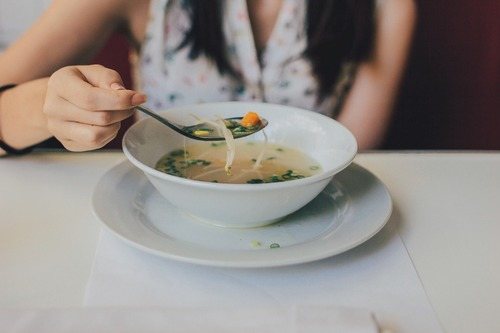
What soups are allowed
Doctors recommend including first courses in the daily diet even for those mothers who did not like soups before pregnancy and childbirth. In the first days of a baby’s life, dietary nutrition based on low-fat broths with a minimum amount of ingredients is useful.
In the first month of life, the crumbs are cooked in beef broth. Gradually, turkey and rabbit meat are included in the diet. Chicken can cause allergies in a baby, so broths based on it must be introduced carefully.
What can harm
There are also soup components that can be not only harmful, but even dangerous. Here is a list of components that you should avoid without the slightest doubt:
- Beets can be a potential allergen and cause flatulence in the baby, so it is better to avoid borscht.
- Pea, lentil and bean soup can also cause a negative reaction in your baby.
- Cabbage is likely to cause colic and whims in the baby.
- Hot spices are also not recommended to be added to dishes.
- The mother should use onions and garlic with extreme caution, and in the first 5-6 months of breastfeeding we advise you to avoid them altogether.
- Mushroom soups will not benefit nursing mothers either: this is too difficult a task for the baby’s digestion, but if you find it difficult to refuse this dish, try a soup based on light champignons, and if the baby responds well to them, increase the portion next time.
If you are a fan of generously adding mayonnaise to soup (and other dishes), then we advise you to give up this bad habit for the entire period of breastfeeding.
When to introduce first courses on the menu
The health of a newborn depends on what his mother eats. From breast milk, the baby receives the vitamins and minerals necessary for normal growth and development. Nutrient deficiency disrupts the normal functioning of the nervous and digestive systems of the child's body. The consequences of improper nutrition of a woman during breastfeeding are colic and whims of the child.
The task of every mother is to develop a balanced diet that will allow the baby’s body to fully develop. Every day a woman’s menu should contain components that promote lactation. Mommy needs to make sure there is enough fluid in her diet. A variety of soups will help her with this. After all, first courses combine liquid and vegetable components necessary for the female body.
Where do we start?
Mothers of a newborn are probably the most vigilant women in the world. Of course, because their baby is still so sensitive to all influences and is just beginning to explore the unknown world. On the one hand, this is a very tender and touching period of the baby’s life, which will forever be etched in the memory of his mother, on the other hand, this is the most important time. Although soups are allowed for a woman literally from the first days of a baby’s life, they should be used in moderation and adhere to some rules:
- Broths are the optimal dish for mom to recuperate and are perfect for restoring strength and quickly saturating the body.
- It is recommended to eat broths exclusively warm and here’s why: hot food can harm the baby through breastfeeding, and a cold dish loses some of its benefits.
- For the first week, it is better to choose vegetable broth without various ingredients: light and healthy food.
- After a week of simple broths, you can gradually dilute them with vegetables - potatoes, zucchini, greens are perfect, but at first use carrots with caution and add them in minimal quantities.
- If you want to pamper yourself with meat broth, prepare it from chicken, beef, rabbit or turkey.
- To prepare the correct meat or fish broth, after 3 minutes of cooking it is recommended to drain it and cook in new water.
- Be sure to rinse vegetables several times before cooking.
- A healthy soup for a nursing mother does not involve fried vegetables: they can only be stewed in a small amount of water and vegetable oil.
Choose only high-quality and fresh ingredients for soup: saving on the health of mother and baby is unacceptable.

Is it possible to have pea soup during lactation?
Boiled peas are unique in that after heat treatment all the beneficial substances remain in the legume. In terms of nutritional value, this ingredient is quite capable of competing with buckwheat or rice. It is important for nursing women to gain energy and vitality; peas cope well with these tasks.
Is it possible for a woman whose baby is breastfed to eat pea soup? This is a question that concerns most young mothers. There is an opinion that this component contributes to the development of colic in a child, but this is a myth.
Recipes for nursing mothers
And finally, after learning the various “dos” and “don’ts,” the fun part begins: preparing delicious and healthy soups. We present you with popular and simple cooking technologies and, we hope, you will replenish your collection of recipes for the breastfeeding period.
Safe puree soup with vegetables
This recipe is a complete complex of vitamins and nutrients that will quickly fill your mother with new strength.
We will need:
- 1 chicken breast;
- 1 medium zucchini;
- 3 potato tubers;
- 1 carrot;
- green onion stalk.
Let's start cooking:
- Boil chicken broth using 2 liters of water, then remove the meat and set aside for a while.
- The broth should be strained and brought to a boil again.
- After this, vegetables are added to the soup to cook.
- When the vegetable component is cooked, chicken is added to it again.
- The soup is almost ready: all that remains is to beat it with a blender until pureed and add chopped onions (if necessary).
Fish soup puree
Fish is an indispensable product for a nursing mother; ideally, it should be on the menu twice a week.
We will need:
- 300 g pollock or hake;
- 1 carrot;
- 50 g pearl barley or millet;
- 8 potato tubers;
- a little salt;
- greens optional.
Let's start cooking:
- Boil the fish in water for 3 minutes and then remove.
- Drain the broth, pour in more water, put the fish in the pan and cook until done.
- Send potatoes to the soup in the form of whole tubers or cut in half.
- Cook the potatoes until tender for about 20 minutes, add cereal to it and cook for 10 minutes.
- Add the chopped fish to the dish and beat everything in a blender to your favorite consistency.
- Add greens for beauty and taste.
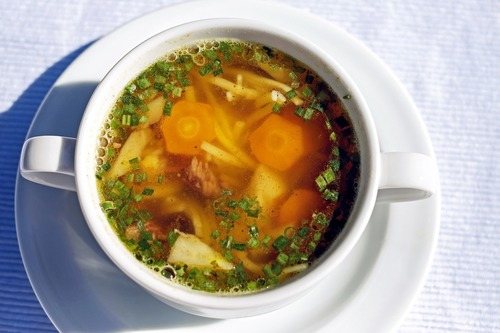
Beef soup with buckwheat
This soup is a very nutritious and tasty dish for a nursing mother, which will also be a hearty lunch for the whole family.
We will need:
- 500 g beef;
- 3 potato tubers;
- 1 carrot;
- 100 g buckwheat;
- greens and salt.
Let's start cooking:
- Cut the meat into pieces and cook for 40 minutes.
- Then, by analogy with previous recipes, drain the water, add new water, a little salt and put it on the fire again. In total, the beef is cooked for about 2 hours.
- Then remove the meat, strain the broth and return to the stove.
- Add chopped potatoes and carrots to the soup.
- The buckwheat needs to be washed and also added to the soup: after boiling, it should cook for 10 minutes.
- When the broth is infused, add chopped beef and herbs to it.
Potato and cauliflower soup
Healthy vegetables go well together and give you a rich taste.
We will need:
- 4 potato tubers;
- 250 g cauliflower;
- 1 carrot;
- 1 PC. leeks;
- salt as desired;
- a little vegetable oil and dill.
Let's start cooking:
- Peel, wash and cut the potatoes into cubes.
- Wash the cabbage and divide it into florets.
- Cover the potatoes with water and salt.
- After the water boils, add the cabbage, then cook the soup for another 10 minutes.
- Simmer the chopped onion and grated carrots until soft and add to the soup.
- After adding the last ingredients, the dish cooks in just 5-10 minutes.
- Add dill to the soup and invite everyone to the table.
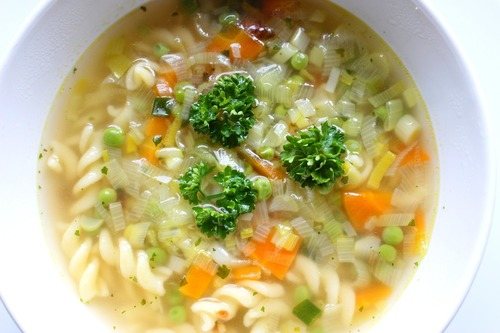
Soup with meatballs and rice
This dish is especially loved by all men, so the whole family will be satisfied.
We will need:
- 500 g minced meat;
- 5 potato tubers;
- 1 carrot;
- 100 g rice;
- Bay leaf;
- some onion and garlic if you can already have them.
Let's start cooking:
- Throw the rice into boiling water and leave to cook.
- In the meantime, take the minced meat and, if necessary, add salt, garlic and onion to it, sometimes add an egg: it turns out even tastier.
- Form the meatballs into small balls.
- After the rice has cooked for about 10 minutes, add vegetables and meatballs to the soup, but do not stir as usual, otherwise the meatballs will lose their shape.
- When the vegetables and meat are almost ready, add bay leaves to the soup and cook for another 5 minutes.
Egg broth with vermicelli
Some babies are allergic to cow protein, but this is not a reason to refuse this dish: you can just take quail eggs.
We will need:
- 2 eggs;
- 150 g vermicelli;
- salt, butter and herbs to taste.
Let's start cooking:
- Add salt, butter and vermicelli to boiling water.
- Beat the eggs and, when the vermicelli is cooked, pour them into the soup in a thin stream: the main thing is to do it slowly and constantly stir the soup.
- After this, cook the broth for a minute.
- Season the dish with herbs and start the meal.
When can soups be included in the diet?
The main thing that every nursing woman should remember is that the products she consumes directly affect the health of the baby, since the child’s body receives all the necessary components and microelements along with mother’s milk. Their deficiency leads to a malfunction of the gastrointestinal tract and negatively affects the nervous state.
Immediately after birth, the baby’s organs are poorly developed and the main task of the nursing mother is to facilitate their adaptation. That is why doctors advise sticking to the most balanced diet possible. And in this case, soups come to the rescue. Breastfeeding women need to consume them immediately after giving birth. The main thing to remember when preparing first courses is that the composition should contain only healthy ingredients that cannot provoke the development of an allergic reaction in a newborn.
Undesirable first course ingredients
The younger the baby is, the more sensitive he is to new foods in his mother’s diet. Food components are passed on to him through breast milk and can provoke unwanted reactions. For this reason, in the first months of a baby’s life, any foods that can cause allergies or increased gas formation, colic, or constipation are inappropriate on a nursing woman’s menu. At the same time, the mother’s body needs healthy and varied food in order to recover faster after childbirth, gain strength and establish lactation. Soup is a dish that can benefit both mother and baby, but the choice of ingredients will have to be taken responsibly. We list popular soup ingredients that are not advisable to consume during breastfeeding, at least in the first 3 months after childbirth:
- Cabbage. This vegetable contains a large amount of coarse fiber and even after heat treatment can provoke flatulence and colic in the baby. Accordingly, you should not rush to introduce borscht and cabbage soup into your diet.
- Fried vegetables or meat. It is recommended to abandon the favorite “roasting” for soup. Food should be dietary and prepared in a gentle way. Fried foods can cause heartburn in mothers and digestive problems in babies.
- Vegetables are brightly colored. Beets can cause allergies in a baby, and also have a laxative effect on the body. Carrots are used to make soups for nursing mothers, but in small quantities. Tomatoes are included in the diet 3–4 months after birth; before adding them to soup, they must be peeled and seeds removed and stewed. Such products should be consumed with caution, observing the child’s reaction.
- Legumes. Peas, beans, and lentils provoke increased gas formation in both mother and baby. With excessive consumption, the colic of the newborn intensifies, the child experiences discomfort and pain in the tummy.
- Hot spices. Bay leaves, peppercorns and salt in reasonable quantities are appropriate in the soup. Hot seasonings and spices can negatively affect the taste of milk and cause digestive problems, so soups like “Kharcho” are undesirable.
- Mayonnaise. The store-bought product contains chemical additives - preservatives, flavorings and others. Homemade mayonnaise is allowed in small quantities, but not earlier than the baby is 3 months old. This type of food is high in fat and contains spices and egg yolks, a potential allergen.
- Onion and garlic. These products have a strong odor and specific taste, which can give the milk an unpleasant aftertaste for the baby. Only a small amount of onion is allowed in the soup - during the cooking process its properties become less expressive.
- Seafood. Despite all the beneficial qualities of seafood, many of them are strong allergens and are not recommended to be consumed in the first months of a baby’s life.
- Cucumbers. Fresh fruits provoke flatulence, while canned ones contain too much salt, spices and vinegar. For this reason, it is not recommended to include rassolnik, a soup based on pickled cucumbers, in your diet.
Mushrooms as a component of soups during lactation cause a lot of controversy. These products take a long time to digest in the intestines and put a strain on the liver. Fungi can also accumulate toxins and heavy metals from the soil. However, breastfeeding experts allow nursing mothers to eat soups made from the safest types of mushrooms - champignons and oyster mushrooms, which are grown on special farms and sold in stores. They can be added to soup fresh, but never canned.
Mushrooms are easiest to digest if they are previously dried and ground into powder, but there are almost no useful substances left in them. Other types of mushrooms, including forest ones, are prohibited.
What ingredients are prohibited?
When choosing recipes for healthy dishes for nursing mothers, it is important to remember that some components of soups can be harmful to the woman herself and the body of the newborn. For the first few months, you should refrain from consuming the following foods:
- beets - this vegetable is a strong allergen and can also cause bloating in a child;
- peas and other legumes are not recommended, since their consumption negatively affects the baby’s digestive system;
- onions and garlic can be eaten starting from the 7th month of feeding;
- mushrooms - the only exception is fresh champignons.
It is also recommended to avoid using herbs and spices when preparing soups. Mayonnaise is also prohibited.
